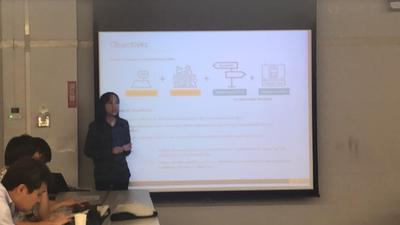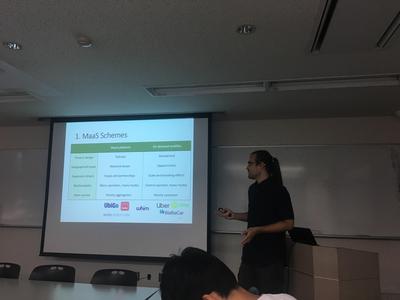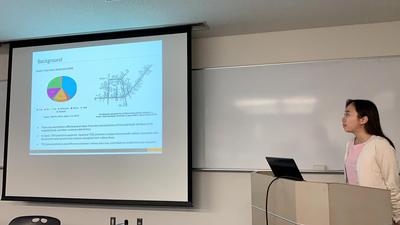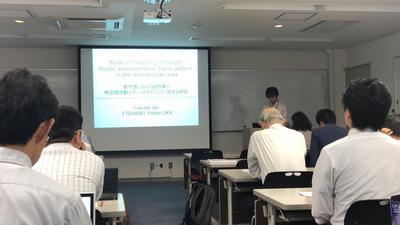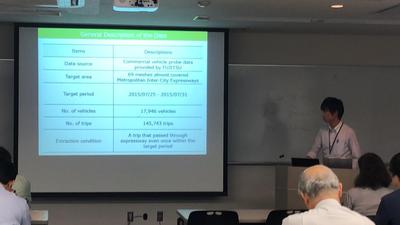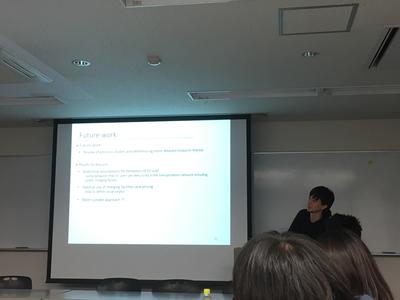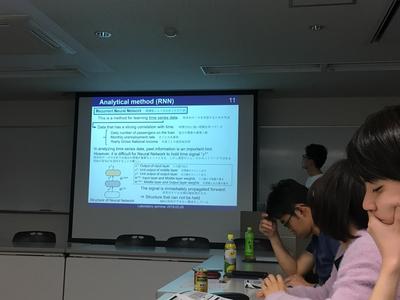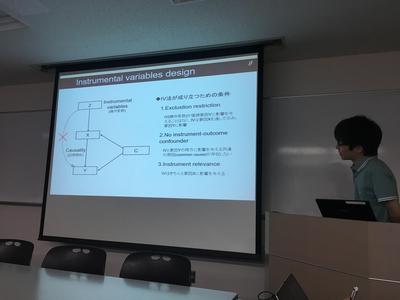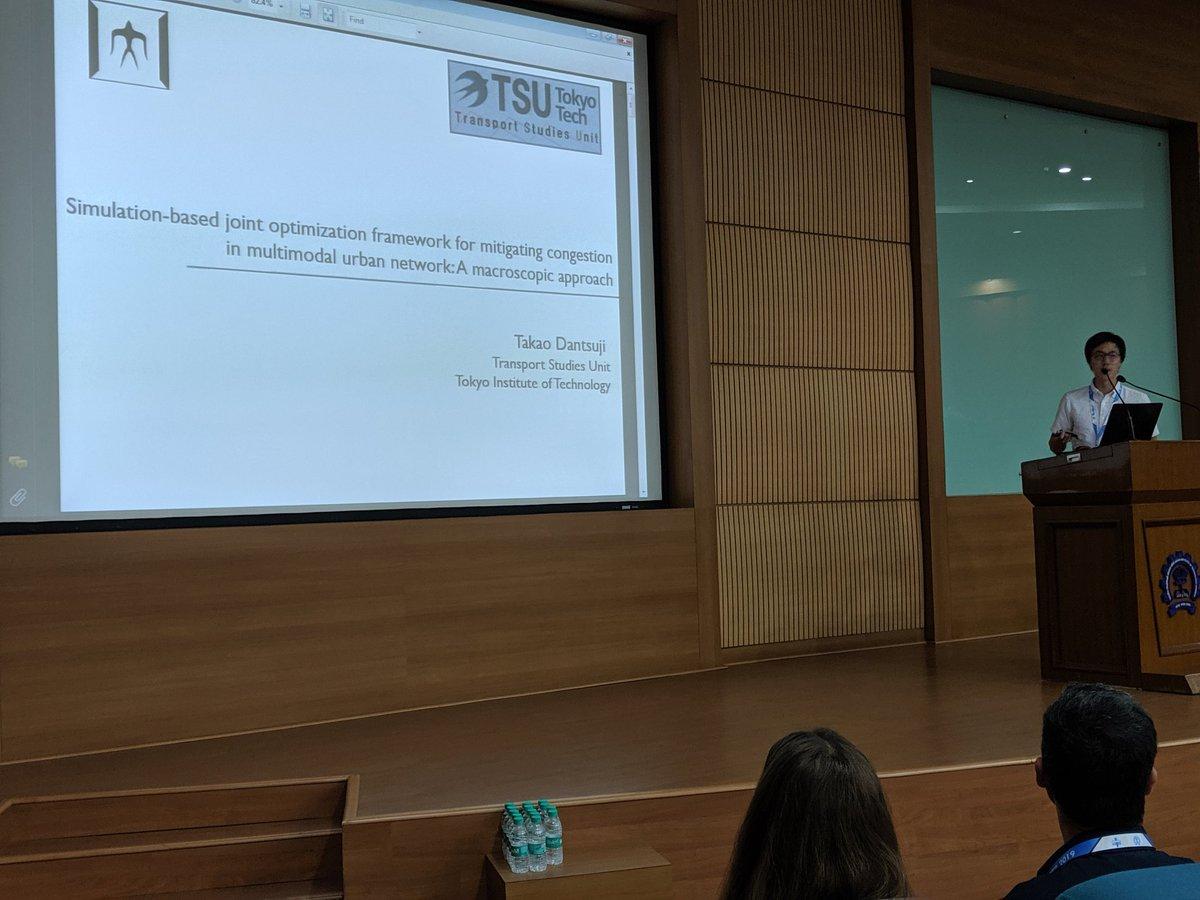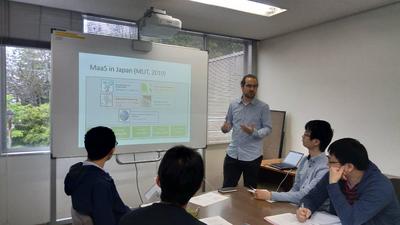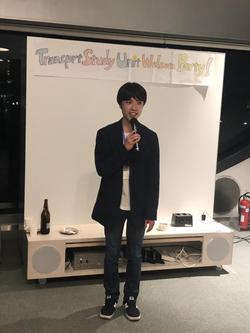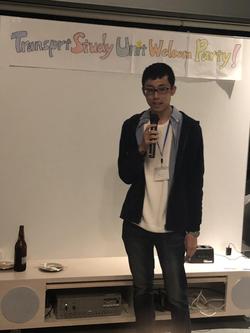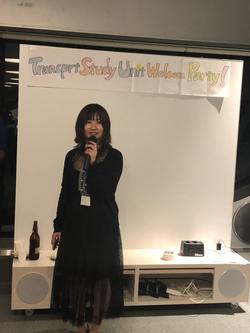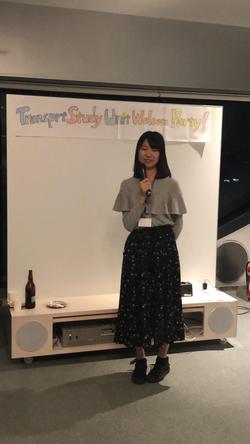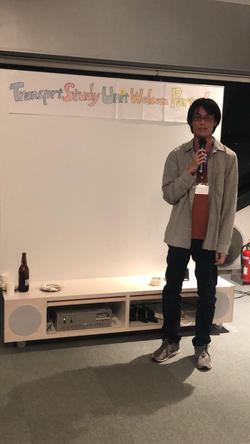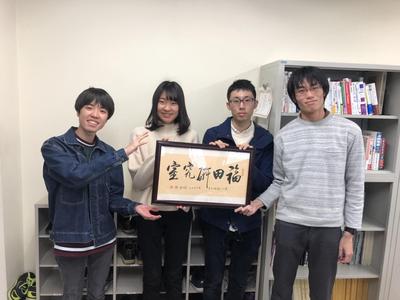Master’s course midterm presentation (Ms. Salsa)
[2019/06/05]
The M2 midterm presentations were held today, and Ms. Salsabila presented from our lab.
Ms. Salsa presented the results of her analysis of the impact of Transit Oriented Development (TOD) on land prices in the Tokyo metropolitan area using a MMMM (Multiple Menbership MMMM (Multiple Menbership Multilevel Model), a type of regression model that takes into account multiple memberships of rail lines, was used to analyze the impact of land prices. During the Q&A session, there was a lively discussion on the differences between TOD (Transit Oriented Development), which has long been conducted by Japanese private railway companies, and TOD in other countries, and how to set up the model used. (Kawai)
The 5th to 8th lab seminars in 2019
[2019/05/30, 06/03, 06/06 & 06/13]
In the 5th lab seminar, (new M1 students) Mr. Koyata and Mr. Shimizu presented their graduation research at their home universities and what they would like to do in the future.
Mr. Koyata presented an analysis of the results of a questionnaire survey conducted in the Minato Mirai area regarding people’s acceptance and evaluation of street trees in redevelopment areas.
Mr. Shimizu presented a plan for restructuring the bus transportation network using smart card data, using the Higashi-Hiroshima City network as an example of the measures to be taken and their evaluation.
In the 6th seminar, Mr. Ge gave a lecture on the Markov Decision Model applied to the Q-learning algorithm, followed by presentations by (B4 students) Mr. Ukai and Ms. Tabuchi on their research topics.
In the 7th seminar, Mr. Kita (M1) presented again the contents of his graduation thesis and his future research plan, and Mr. Wang (M1) presented his research plan on flow analysis of tourist attractions using WiFi data.
In the 8th lab seminar, Mr. Azarel (D1) presented his research concept on Mobility as a Service (MaaS). Moreover, Ms. Salsabia (M2) presented the results of several models on the impact of TOD on land prices in the Tokyo metropolitan area and compared them.
(Kawai)
Doctoral Course Midterm Presentation (Mr. Oka)
[2019/05/29]
The interim presentation of the doctoral students was held today, and Mr. Oka (D2), a working doctoral student from our laboratory, gave a presentation.
Mr. Oka’s research, entitled “A Study on Modeling Spatio-Temporal Flow Patterns of Freight Vehicles in Urban Areas,” takes a macro view of logistics survey data in metropolitan areas and constructs several models, including a Nested Recursive Logit model, to analyze the route selection and tour pattern selection of freight vehicles in each time series. The study analyzes the route selection and tour pattern selection of freight vehicles by time series. During the Q&A session, there was a lively discussion on the possibility of differences in estimates due to differences in the characteristics of the different models used. (Kawai)
The 2nd & 3rd lab seminar in 2019
[2019/05/09 & 05/16]
Mr. Ogawa and Mr. Shiroma were in charge of the second lab seminar, and Mr. Muro and Mr. Kawai were in charge of the third lab seminar. All of them were M2 students and presented their research concepts mainly for their master’s thesis.
Mr. Ogawa presented his analytical research on short-term traffic volume forecasting on roads using deep learning, focusing on the city of Kamakura. Kamakura has many tourist attractions concentrated in a small area, and traffic congestion is an issue.
Mr. Shiroma presented his research concept on analyzing users’ transportation preferences as electric vehicles (EVs) become more popular.
Mr. Muro presented his research idea and basic knowledge of causal-effect analysis on a method to evaluate the effect of transportation infrastructure development using the causal inference modal.
Mr. Kawai presented his research concept on the transportation demand forecasting when the workplace changes due to the spread of teleworking and the survey analysis of users’ transportation preferences for satellite offices.
World Conference on Transport Research Society (Mr. Dantsuji)
[26 May 2019]
Mr. Dantsuji (D3) from our lab gave a speech at the World Conference on Transport Research Society (WCTRS), which was held in Mumbai, India.
In his presentation titled “Simulation-based joint optimization framework for mitigating congestion in multimodal urban network: A macroscopic approach”, he adopted a simulation-based optimization method for traffic demand management using 3D-MFD.
We have received many useful comments regarding the optimization algorithm and transportation network. Here, we would like to take this opportunity to express our gratitude towards them.
| Conferences Lab Life by Students
The 2nd – 4th learning seminar in 2019
[2019/05/14, 05/21 & 05/28]
In the 2nd learning seminar,Mr. Ogawa (M2) gave an introduction to Python. As in the previous seminar, we covered basic data aggregation using Jupyter Notebook, a tool for data analysis, and since Python is a software that is used not only for statistics but also for a wide range of other purposes, it is definitely something we want to be able to use!
In the 3rd seminar, Mr. Shiroma (M2) covered some regression analysis methods, from theory to coding using R, including the least squares method (OLS), the instrumental variables method (IV), and the generalized least squares method (GLS).
In the 4th basic seminar, Mr. Muro (M2) covered multivariate analysis methods, from theory to coding using R for factor analysis and covariance structure analysis. (Kawai).
The 1st learning seminar in 2019
[2019/05/07]
In the first basic seminar of this year, Mr. Kawai (M2) introduced R, a free software and programming language for statistical analysis. I think this seminar covered the basics of data aggregation in a nutshell. Programming is a skill that can only be mastered by actually writing with your hands, so let’s keep up the good work!
In 2019, each student will be in charge of a 90-minute presentation, and the seminar will mainly focus on programming implementation exercises.
*As a start-up, Fukuda Laboratory conducts a basic seminar on the basic theories (traffic behavior and traffic networks) necessary for traffic analysis in the first 2-3 months of the fiscal year. 2018 fiscal year, the seminar will focus on two topics, “traffic behavior analysis” and “traffic network analysis,” with the aim of learning basic theories and application methods (e.g., programming skills). (Kawai).
The 1st lab seminar in 2019
[2019/04/25 ~ 04/26]
The first lab seminar of this year was led by Ms. Salsa (M2), Mr. Azarel (D1), and Mr. Gabe (M1) from the University of the Ryukyus. The laboratory seminar is an opportunity for the presenters to explain their research in broad strokes, with the aim of sharing their research with the rest of the laboratory.
Ms. Salsa analyzed the impact of TOD (development along rail lines) on land prices in the Tokyo metropolitan area using regression analysis, and Mr. Azarel presented a literature review on MaaS (Mobility as a Service) in Japan and abroad.
Mr. Gabe from Kamiya Laboratory, University of the Ryukyus, stayed at our lab for two weeks until today and presented his research on the analysis of a tourism flow survey using Wi-Fi packet sensors. It was a short stay, but a fun one! See you again! (Kawai)
TSU Welcome Party
[2019/04/22].
The annual TSU welcome party was held again this year. TSU (Transport Studies Unit) is a joint gathering of five transportation planning laboratories for seminars and events. I believe that we were able to deepen exchanges beyond the boundaries of the laboratories today.
We also asked each new student to introduce himself/herself and tell us something interesting that happened to him/her recently! Everyone has an interesting story. I am looking forward to seeing them in the future!
New members (April 2019)
[April 10, 2019]
Four new members joined our lab this April!
◯Undergraduate students, B4
Ms. Keiko Tabuchi
Mr. Kenta Ukai
◯Master’s students, M1
Mr. Hiroki Koyata
Mr. Hiroki Koyata
Also, Mr. Arata Gabe (M1) from Kamiya Laboratory, University of the Ryukyus, will be staying with us for 3 weeks. Our laboratory has become lively again.
Let’s work hard together in the lab from now on! (Kawai)
